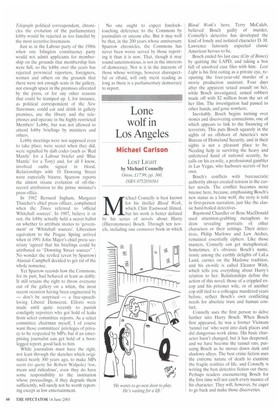Lone wolf in Los Angeles
Michael Carlson
LOST LIGHT by Michael Connelly Orion, £17.99, pp. 360, ISBN 0752856561 Michael Connelly is best known for his thriller Blood Work, which Clint Eastwood filmed, but his work is better defined by his ,,cries of novels about Harry (Hieronymous) Bosch. Through ten novels, including one crossover book in which
Blood Work's hero, Terry McCaleb, believed Bosch guilty of murder, Connelly's detective has developed the kind of lonely and isolated character D. H. Lawrence famously expected classic American heroes to be.
Bosch ended his last case (City of Bones) by quitting the LAPD, and taking a box full of unsolved case files with him. Lost Light is his first outing as a private eye, reopening the four-year-old murder of a movie production assistant. Four days after the apparent sexual assault on her, while Bosch investigated, armed robbers made off with $2 million from the set of her film. The investigation had passed to other hands, and gone nowhere.
Inevitably, Bosch begins turning over stones and discovering connections, one of which appears to link to the financing of terrorists. This puts Bosch squarely in the sights of an offshoot of America's new Bureau of Homeland Security, and in their sights is not a pleasant place to be. Needing help in surviving the heavy and unfettered hand of national security, he calls on his ex-wife, a professional gambler in Las Vegas, who harbours secrets of her own.
Bosch's conflicts with bureaucratic authority always created tension in the earlier novels. The conflict becomes more intense here, because, emphasising Bosch's new status as a lone wolf, the story is told in first-person narration, just like the classic hard-boiled detectives.
Raymond Chandler or Ross MacDonald used attention-grabbing metaphors to draw revealing portraits of other characters or their settings. Their detectives, Philip Marlowe and Lew Archer, remained essentially ciphers. Like those masters, Connelly can get metaphorical. Sometimes, it's obvious; Bosch's name, ironic among the earthly delights of LaLa Land, carries on the Marlowe tradition, and his ex-wife is called Eleanor Wish, which tells you everything about Harry's relation to her. Relationships define the action of this novel; those of a crippled excop and his prisoner wife, or of another cop still tied to a colleague murdered years before, reflect Bosch's own conflicting needs for absolute trust and human contact.
Connelly uses the first person to delve further into Harry Bosch. When Bosch first appeared, he was a former Vietnam 'tunnel rat' who went into dark places and did dangerous work alone. His basic character hasn't changed, but it has deepened, and we have become the tunnel rats, pursuing Bosch as he moves down dark and shadowy alleys. The best crime fiction uses the extreme nature of death to examine the fragile realities of life, and Connelly is writing the best detective fiction out there. Perhaps readers encountering Bosch for the first time will not catch every nuance of his character. They will, however, be eager to go back and make those discoveries.


































































































 Previous page
Previous page